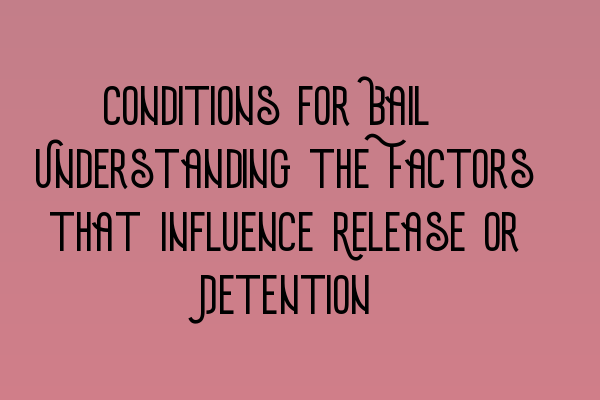Conditions for Bail: Understanding the Factors that Influence Release or Detention
When it comes to criminal cases, one of the most crucial decisions is whether to grant bail to the accused or detain them until their trial. In the UK, the decision on whether to release a person on bail is determined by several factors that need careful consideration.
Importance of Bail Conditions
Bail conditions are conditions that are imposed on a person released on bail. These conditions aim to ensure that the accused appears in court for their trial and to prevent further offenses or harm to the public. The court has the discretion to set additional conditions, which can vary depending on the circumstances and severity of the alleged crime.
When determining bail conditions, the court takes into account several factors:
Flight Risk
One of the primary factors considered is the flight risk of the accused. The court will assess whether the person is likely to abscond and not attend their trial, based on factors such as their ties to the community, employment status, family relationships, and previous criminal history. The court may impose conditions such as passport surrender, regular reporting to a police station, or electronic monitoring to mitigate flight risk.
Risk to Public Safety
The court also assesses the risk that the accused poses to public safety. If the alleged crime is violent or involves a high level of harm, the court may impose stringent conditions or deny bail altogether. Factors such as the seriousness of the offense, the likelihood of reoffending, and the presence of any previous convictions are taken into consideration.
Witness Intimidation or Tampering
Another crucial factor is the potential for witness intimidation or tampering. If there is a reasonable belief that the accused may interfere with witnesses or obstruct the course of justice, the court may impose conditions to protect the integrity of the trial. These conditions can include non-contact orders, exclusion zones, or restrictions on communication.
Prevention of Further Offenses
The court also considers whether releasing the accused would pose a risk of committing further offenses. If there is evidence to suggest that the accused may continue to engage in criminal activity while on bail, the court may set strict conditions or deny bail entirely to protect the public.
Community and Family Ties
The ties the accused has to the community and their family also play a role in the bail decision. Having strong community and family ties can serve as an assurance that the accused would not flee and would comply with the conditions set by the court. These ties can be demonstrated through evidence of stable employment, owning property, family support, or strong community involvement.
Conclusion
Understanding the factors that influence the decision to grant bail is essential for anyone involved in the criminal justice system. Flight risk, risk to public safety, witness intimidation or tampering, prevention of further offenses, and community and family ties are all factors that the court takes into account when deciding whether to release an accused person on bail. It is crucial to seek expert legal advice to navigate the complexities of bail conditions and ensure the best outcome for your case.
For more information on related topics:
- SQE 1 Practice Exam Questions
- SQE 1 Practice Mocks FLK1 FLK2
- SQE 2 Preparation Courses
- SQE 1 Preparation Courses
- SRA SQE Exam Dates
Remember, legal advice tailored to your specific case is essential. Consult with a qualified solicitor at SQE Criminal Law & Practice Law UK to understand the intricacies of your situation and receive the guidance you need.
Disclaimer: This blog post is for informational purposes only and does not constitute legal advice. The content provided is accurate to the best of our knowledge at the time of writing. Laws and regulations may vary, so it is advisable to consult with a legal professional for specific case guidance.
